Items
Search full-text
“The Australian Government announced a National Autism Strategy in 2022”
- Creative Australia
-
“Assistance to Composers Advisory Board created by the Commonwealth government.” In 1967, the Commonwealth government created the Assistance to Composers Advisory Board with an aim to advise on funding needs for music composition and promotion of Australian composers. The Board was to judge work based on “musical distinction or excellence of its kind, and on the promotion of Australian composers both in Australia and abroad”. The Board’s functions were later absorbed by the Australia Council.
-
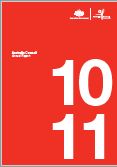 "Australia Council - Annual Report 2010-11" Australia Council Annual Report 2010-2011 – discusses year in review, letter from chairman, vision, list of council staff, message from the CEO, Strategic priorities, funding overview, statement of outcome, about the Australia Council including governance, boards, organisation, accountability, workplace; financial review and discussion of the Commonwealth Disability Strategy with a review of how the Disability Action Plan 2008–2010 addresses Australia Council roles of policy adviser, purchaser, provider and employer and how Council is committed to the National Arts and Disability Strategy adopted in October 2009 with ministers agreeing on four priority areas of action -addressing barriers, supporting practice, developing audiences and improving policy.
"Australia Council - Annual Report 2010-11" Australia Council Annual Report 2010-2011 – discusses year in review, letter from chairman, vision, list of council staff, message from the CEO, Strategic priorities, funding overview, statement of outcome, about the Australia Council including governance, boards, organisation, accountability, workplace; financial review and discussion of the Commonwealth Disability Strategy with a review of how the Disability Action Plan 2008–2010 addresses Australia Council roles of policy adviser, purchaser, provider and employer and how Council is committed to the National Arts and Disability Strategy adopted in October 2009 with ministers agreeing on four priority areas of action -addressing barriers, supporting practice, developing audiences and improving policy. -
“100 disabled people protest outside Parliament House against moves to tax their government allowances” On 29 September 1978, 100 people with disability protested outside Parliament House against moves to tax their government allowances. Following the protest, Treasurer John Howard was forced to rescind the decision.
-
“The report ‘Inquiry into Health Services for the Developmentally Disabled and Psychiatrically Ill’ (aka the Richmond Review) is published by the NSW Government.” In 1983, the seminal NSW Government report, ‘Inquiry into Health Services for the Developmentally Disabled and Psychiatrically Ill’ was published. The NSW inquiry, also known as the Richmond Report due to its chair, David T. Richmond, revolutionised the institutional landscape by explicitly linking disability services to human rights for the first time in Australia and highlighting the critical need for advocacy "mechanisms" that actively allowed people with disabilities to "speak for themselves."
-
“In 2014, the Australia Council introduces its first grant specifically for artists with disabilities” In 2014, the Australia Council introduces its first grant specifically for artists with disabilities. Then Australia Council CEO Tony Grybowski announced “the Artists with Disability Pilot Program; the Council’s Disability Action Plan for 2014-2016; and additional funding for Arts Access Australia to increase career development and employment opportunities for artists with disability.” The pilot program granted $300,000 to disabled artists to develop and present their work. Following this, the program was extended for another three years. The “million dollar investment” would “provide development grants of up to $25,000 and project grants of up to $50,000 for individuals and groups.” That same year, the Australia Council received its first ever grant application in Australian Sign Language (Auslan). However, in 2019, Australia Council ended its dedicated funding program for disabled artists and replaced it with the National Arts and Disability Awards.
-
"South Australian Film Corporation (2018) Disability Screen Strategy" Reads, in part "Launched in 2018 under the SAFC’s Delivering Diversity umbrella, FULL TILT is the SAFC’s initiative for an inclusive approach to skills development for screen content makers with disability, and a starting point for driving change across the industry to achieve greater inclusion for practitioners with disability to develop their craft."
-
“ABC appoints Stella Young as editor of Ramp Up” In 2010, ABC announced the appointment of Stella Young as editor of its first (and short-lived) dedicated disability platform, ABC Ramp Up. Shawn Burns’s 2014 article in The Conversation laments the closure of the initiative and the loss of a vital platform for better disability representation in Australian media. The URL link to the Ramp Up page now opens with the following statement: “This website is no longer being updated but remains online as an archive of three and a half years of discussions and conversations regarding disability in Australia.”
-
"Commonwealth of Australia, 2018. Research Overview: Arts and Disability in Australia. Barton: Department of Communication and the Arts, Cultural Ministers Council. Available from: https://www.arts.gov.au/sites/g/files/net1761/f/research_overview_of_arts_and_disability.pdf." Reads, in part "The Research Overview brings together published and unpublished data and research about arts and disability in Australia, and case studies highlighting arts and disability practice around the country. The Research Overview is part of the evidence base for a renewed National Arts and Disability Strategy. The evidence gathered here will be complemented by submissions and survey during a national consultation in 2018."
-
"Australia Government (2019) My Art Goals: NDIS and the Arts. Canberra: Department of Communication and Arts." Reads, in part "My art goals shows some of the ways National Disability Insurance Scheme (NDIS) participants who have creative or cultural jobs, or who want to participate recreationally in the arts, can reach their goals. My art goals provides information about how the NDIS might support participants with arts goals, or about what supports or services might be available outside the NDIS."
-
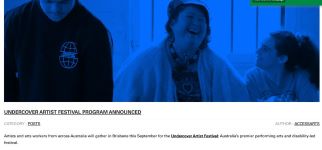 "Undercover Artist Festival Program Released 2021" Undercover Artist Festival 2021, curated by Festival Director Madeleine Little, including Lauren Watson’s Nerve, Andi Snelling’s Happy-Go-Wrong, Naavikaran’s Brown Church, Oliver Hetherington-Page’s The No Bang Theory in the ‘Creative’ program track, and work by Timothy Orton, Mitchell Runcie and Allycia Staples from The Sunshine Troupe in the ‘Community’ track.
"Undercover Artist Festival Program Released 2021" Undercover Artist Festival 2021, curated by Festival Director Madeleine Little, including Lauren Watson’s Nerve, Andi Snelling’s Happy-Go-Wrong, Naavikaran’s Brown Church, Oliver Hetherington-Page’s The No Bang Theory in the ‘Creative’ program track, and work by Timothy Orton, Mitchell Runcie and Allycia Staples from The Sunshine Troupe in the ‘Community’ track. -
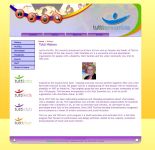 "Tutti Arts - Website - History, captured 2007" Tutti Arts Website History captured 2007 - reads, in part "Led by Pat Rix, SA’s recently announced Local Hero for her work as founder and leader of Tutti in the Australian of the Year Awards, Tutti Ensemble Inc is a successful arts and educational organisation for people with a disability, their families and the wider community now into its 10th year. Inspired by the musical term tutti - meaning everyone will now perform together after only a few have been allowed to play, Pat began Tutti as a singing group of nine people with an intellectual disability in 1997 at Minda Inc. That original group has now grown into a music community of well over 150 people. Tutti became incorporated as the Tutti Ensemble Inc, a not for profit organisation with charitable status, in 2001."
"Tutti Arts - Website - History, captured 2007" Tutti Arts Website History captured 2007 - reads, in part "Led by Pat Rix, SA’s recently announced Local Hero for her work as founder and leader of Tutti in the Australian of the Year Awards, Tutti Ensemble Inc is a successful arts and educational organisation for people with a disability, their families and the wider community now into its 10th year. Inspired by the musical term tutti - meaning everyone will now perform together after only a few have been allowed to play, Pat began Tutti as a singing group of nine people with an intellectual disability in 1997 at Minda Inc. That original group has now grown into a music community of well over 150 people. Tutti became incorporated as the Tutti Ensemble Inc, a not for profit organisation with charitable status, in 2001." -
“The inaugural Undercover Artist Festival, a biennial, disability-led performing arts festival, is held in 2015” In 2015, the inaugural Undercover Artist Festival took place. The festival was founded by Access Arts in consultation with Access Arts participants and a group of artists with disability. The festival has consistently been directed by leaders who identify as experiencing disability.
-
“Access Arts Achievement Award inaugurated in 2014” Access Arts announced a $10,000 Achievement Award in 2013 and first awarded the grant in 2014 to actor Doug Robins. Other recipients since then have included writers, musicians, visual artists, theatre makers, and multi-disciplinary artists. The funding goes to a Queensland artist with disability to “create, develop, present, produce, exhibit and/or tour their work.” Access Arts describe it as “a game-changing opportunity for Queensland artists, arts workers and producers to extend the life of an existing work or create a new one!”
-
“A national Disability Advisory Council is established in 1983” The national Disability Advisory Council (DACA) was established in 1983. Parliamentary information from 26 July that year reports: “Disabled people will form a significant majority on the new body. Announcing this today, the Minister for Social Security, Senator Don Grimes, said the new Disability Advisory Council of Australia represented an important breakthrough for disabled people. For the first time, an Australian Government will be looking to disabled people themselves for advice on government policy and programs affecting them.”
-
"The report Shut Out: The Experience of People with Disabilities and their Families in Australia is published in 2009" In 2009, Shut Out: The Experience of People with Disabilities and their Families in Australia was published. This report was commissioned by the Australian Government as part of the National Disability Strategy. It was prepared by the National People with Disabilities and Carer Council.
-
“Handicapped Persons Assistance Act 1974” Compared to earlier decades, the mid-1970s saw an increase in political activity pertaining to individuals with disabilities. The Handicapped Persons Assistance Act (HPAA) of 1974 is one such example, which replaced several policies and funded non-government organisations that provided care and housing. In 1983, the Hawke Labour Government instigated an evaluation of the initiatives created under the HPAA. The HPAA was replaced in 1986 by the Commonwealth Disability Services Act of 1986.
- South Australian Film Corporation
- Arts Project Australia
-
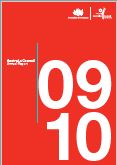 "Australia Council - Annual Report 2009-10" Australia Council Annual Report 2009-2010 – discusses year in review, letter from chairman, vision, list of council staff, message from the CEO, Strategic priorities, funding overview, statement of outcome, about the Australia Council including governance, boards, organisation, accountability, workplace; financial review and discussion of the Commonwealth Disability Strategy with how the Disability Action Plan 2008–2010 addresses Australia Council roles of policy adviser, purchaser, provider and employer.
"Australia Council - Annual Report 2009-10" Australia Council Annual Report 2009-2010 – discusses year in review, letter from chairman, vision, list of council staff, message from the CEO, Strategic priorities, funding overview, statement of outcome, about the Australia Council including governance, boards, organisation, accountability, workplace; financial review and discussion of the Commonwealth Disability Strategy with how the Disability Action Plan 2008–2010 addresses Australia Council roles of policy adviser, purchaser, provider and employer. -
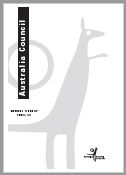 "Australia Council - Annual Report 1995-96" Australia Council Annual Report 1995-96- discusses functions, organisation chart, arts funding, audience development and advocacy with collaboration with various government departments to focus on advocacy for minority groups including people with disabilities, strategy and policy with Arts and Disability report, describing the barriers to intellectual and physical access to the arts experienced by people with a disability and the implications for arts organisations of the Disability Discrimination Act 1992, main activities of Council and its Boards, and includes financial statements and lists of grants made including grants for programs, projects, information and advocacy.
"Australia Council - Annual Report 1995-96" Australia Council Annual Report 1995-96- discusses functions, organisation chart, arts funding, audience development and advocacy with collaboration with various government departments to focus on advocacy for minority groups including people with disabilities, strategy and policy with Arts and Disability report, describing the barriers to intellectual and physical access to the arts experienced by people with a disability and the implications for arts organisations of the Disability Discrimination Act 1992, main activities of Council and its Boards, and includes financial statements and lists of grants made including grants for programs, projects, information and advocacy. -
“Les Murray's poetry is influenced by his autism” In 1974, Les Murray wrote a poem about autism, ‘Portrait of the Autist as a New World Driver’. Over the decades since, autism has continued to be a theme, as recognised by Amanda Tink.
-
“Protesters gather in Lismore (NSW) to oppose proposed cuts to services” In 2004, 300 disabled persons, along with their relatives and carers, gathered in Lismore to protest proposed cuts to adult, training, learning, and support programs, among other services. These were a part of a series of demonstrations against the state government that included hundreds of demonstrators in Newcastle and resulted in the state government reversing its position on modifications to the Post-Schools Options Disability Program.
-
“Office of the Arts releases 'Creative Australia – National Cultural Policy' (2013) , is critiqued for its reference to 'tolerance' of disabled people” The national cultural policy ‘Creative Australia’ was published in 2013. It was critiqued for its lack of disability arts funding and its reference to 'tolerating' disabled people. As Arts Hub reported, “By now you will have heard that the National Cultural Policy offers little for Australians with a disability. Not only is there no funding for the National Arts and Disability Strategy, but instead, the policy calls for a culture of tolerance towards people with a disability.”
-
"Bree Hadley (2022) Disability and the Arts, Creative, and Cultural Industries in Australia. Australian Academy of Humanities" Reads, in part "There are five interrelated factors that support arts workers, arts organisations, and the arts sector at large to develop improved policy, protocol, and training practices."
